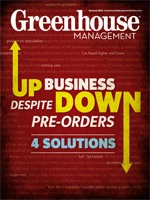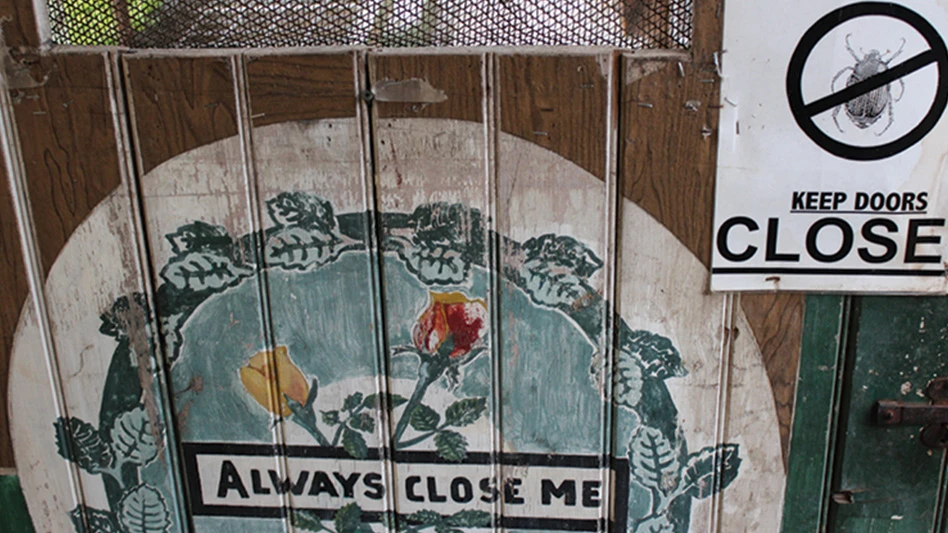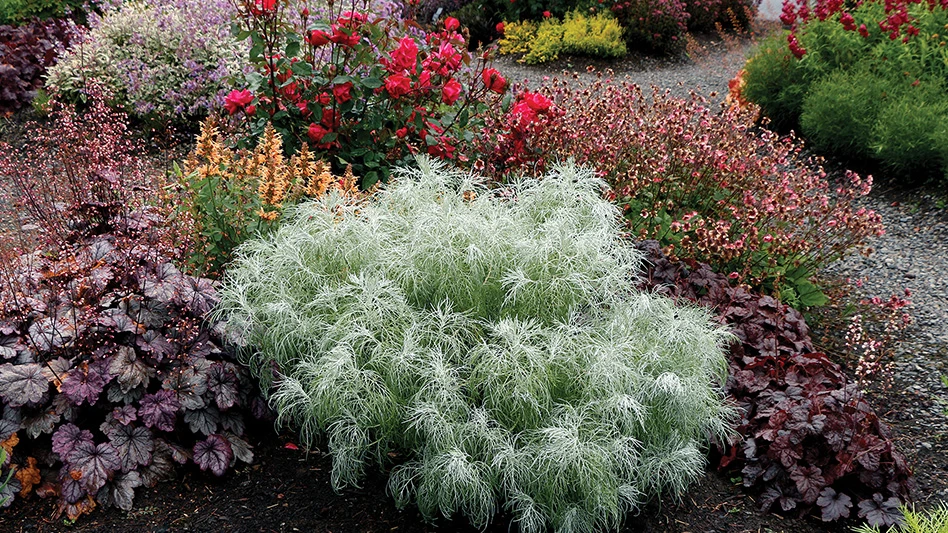 Andy Krieger did his first major spam preparing for this year. He had never just sent out e-mail feelers to masses before, opting instead for a more personalized approach with fliers and packets. But with his 2012 pre-orders down 30 percent, he needed something cost-effective that would get a lot of information out to a ton of people.
Andy Krieger did his first major spam preparing for this year. He had never just sent out e-mail feelers to masses before, opting instead for a more personalized approach with fliers and packets. But with his 2012 pre-orders down 30 percent, he needed something cost-effective that would get a lot of information out to a ton of people.
"What it really amounts to is trying to drum up people's interest, and it hasn't happened," says Krieger, co-owner of E. Krieger Greenhouses in Jefferson, Iowa. "We don't grow this product on speculation anymore, and we're not going to be able to just pull it off the benches come April if stores don't start getting on the bandwagon."
It's not just Krieger. His contacts on the East Coast, other areas of the Midwest and out West have all said the same thing.
"Everybody sees it down 30 percent," he says. "I've heard higher and lower, but rule of thumb is 30 percent."
Forrest Stegelin, associate professor of agricultural and applied economics at the University of Georgia has heard from growers in the Southeast that pre-bookings are also down.
"Everybody seemingly thought sales would be up for the coming year, and a handful thought it would decline, and maybe two handfuls thought it would be steady, and everybody else thought it would be more favorable. But pre-orders have not met the expectations, so what do we do?" he says. "Is it weather problems, is it economic problems with the customers, is it some other issue? It's probably yes to all of the above if we were doing a multiple-choice question."
|
Ways to combat raising your prices when your competition doesn't Forrest Stegelin, associate professor of agricultural and applied economics at the University of Georgia, says one way to combat low pre-orders is to raise your prices, but growers may fear raising their prices and losing business to competitors who don't. Here are some of his tips to overcome that issue. 1. Features. Even if it's a trivial feature, it might just be in terms of a different color or a different scent or some sensory activity or change that is different from what they're used to seeing. 2. Your name. While you may not be growing branded plants, every plant you put out represents a brand – brand you. You're established, so you want your ultimate customer – the home consumer – to want to look for your materials when they go to the garden center. You want them to ask for your product specifically, and when that happens, it adds value and justifies the price. 3. Convenience. Provide information about your product to the consumer so they don't have to look it up themselves. 4. Quality. Does your product have an extended shelf life? Are they hardier? Are they more drought-tolerant? If so, market that. 5. Location. Local matters these days. People want to know they're supporting others in their communities, so if your product goes primarily to retailers in your area, market that attribute because their customers will pay for it. 6. Trust. If your products are reliable for the retailer, then essentially the retailer's customers are coming back because they trust the product. Approach them like you're a team working together in a business-to-business-to-customer model. |
Speculation is out
Pre-bookings typically give growers a fairly accurate way of gauging where a year is headed. Krieger says that during the past 15 years, growers have done a great job of getting retailers to pre-book by educating them about why it's important – so they have specific varieties, have new items and to do the store justice. But heading into 2012, that pre-order trend has fallen off, and it has growers worried.
"Because of the economy, we saw it a little bit last year, and we've seen it three-fold this year," Krieger says. "They don't want to pre-book anymore. Well, there's no margin to speculate. None of us have enough fat on our back to speculate."
But that includes garden centers, which have been hit hard. The economy is one major issue they face. Consumers haven't had extra money to spend or they may have to move because of financial hardships, so they're less willing to invest in their landscaping. Trey Pitsenberger, owner of The Golden Gecko Garden Center in Garden Valley, Calif., says these consumers are unlikely to plant fruit trees that they can't take with them if they move and are more likely to plant smaller things like vegetable gardens.
"Let's be honest," he says. "We are going through something none of us have gone through before. I see no reason for bumping up orders for this year, especially here [in California]. There is no catalyst for growth, our state government is just now starting to make major cuts, and we have a 10 percent-plus unemployment rate. Cautious doesn't begin to describe the feeling here. Deer in the headlights might be better."
In addition to the lack of growth catalysts, last year's havoc-wreaking weather across the country has some retailers on edge this year. Rain played a huge part in many areas of the country, including in Missouri for Sandi McDonald, owner of Hillermann Nursery & Florist in Washington, Mo. McDonald said her pre-bookings for 2012 are about 10 percent less than what was sold between March and May last year.
"I see the independent garden center market as pretty weak right now," she says. "Sadly, there are too many closing up shop and selling out."
While many areas of the country dealt with unprecedented rain, other parts would have paid an arm and a leg to get a drop of water. Merrideth Jiles, general manager of The Great Outdoors in Austin, Texas, said that Texas suffered horribly in 2011.
"Plant bookings are down here strictly due to weather," Jiles says. "We just had the longest, driest, hottest summer ever on record. Some meteorologists say this could be the beginning of a five- to 10-year drought. From April to October, sales were down for the first time in my 11 years here."
Weather and economic challenges only begin to describe the problem facing growers, and it's easy to get caught up in a blame game, but the fact remains: you have to grow product, and you have to sell product, so how do you overcome lower pre-bookings? Here are four key ways to combat the caution that retailers are operating under right now.
Forecast your sales
Stegelin says it's important to not just say your orders are down or up but to also see if the number of plants each customer orders is up or down. He says you have to understand the ultimate customer – the person walking into the garden center – to understand your initial customer – the garden center.
"Who do you think is the ultimate customer, and what is their buying power to the retailer that you are supplying these plants?" he says. "What would be the initial and accurate sales forecast? Try to do some formal analytics."
Your formal analytics may mean calling your customers before the season and ask, "What do you expect next year to be?"
"[Say] 'I want to make sure I've got everything that your customers will be wanting – not only how much sales volume are you expecting, but what plants do you expect will be the ones that those customers will be seeking? I want you to win, and I want this to be a win-win proposition,'" Stegelin says. "That's getting a sales forecast so you can do the proper production."
By talking to your customers and creating a partnership, it gives you more opportunity to come back to them later when they may not have ordered as much as they initially indicated.
"If they made the commitment verbally, and this is based upon experience, that they're expecting sales to be a certain level, then when, even though their pre-order tendency may be to do less, they feel they have a vested interest in getting the sales to the level they conveyed," Stegelin says. "In some cases, it's a matter of the dominoes falling in the right direction."
Grow less on speculation
John Hoffman, owner of Hoffman Nursery in Rougemont, N.C., has seen winter plant orders go down the past several years, so as a result, he's producing less on speculation, which is another key to overcoming low pre-orders.
"We have scaled back production from what we did in the past, and we're producing less on speculation," Hoffman says. "Years ago you could produce anything and it would go out the door. That's not the case anymore. The plants that we are producing on speculation are the basics. If you want more obscure items, you'll have to special order that, and it takes some time.
"We do grow grasses, and they do grow quickly, but we can't produce these things overnight."
Krieger is doing the same.
"We're all saying, 'Fine, we have to cut production – we don't want to go out on a limb if you don't want to go out on a limb,'" he says.
The scary part for Krieger is that he knows stores are going to want the product, so he's struggling to find that balance between not speculating too much while still having some product available for customers.
"We're not going to speculate," Krieger says. "We're going to cover our obligations financially and make sure that we have enough product on the bench to meet all of our needs and make it through the season, but we won't speculate 30, 40, 50 percent of our product because that's just overproducing. To us, it's stupid to just fill the benches, no matter what, and hope we sell it. There's too much value in either underselling our product ... and there's too much cost of product to throw it away."
Help your customer
Inevitably, while your pre-orders may be down, you'll get calls this spring from retailers wanting to fill their shelves with products that customers are demanding. You may have some of that product on hand, or maybe you won't, but simply filling that order is the wrong approach, says Stegelin.
He says that some of the products retailers are requesting, by the time they get to the garden center, will be irrelevant, as it will be time for a new product.
"The customer is already going to say, 'It's too late for those, let's work on the next appropriate plants to be put in the ground, and not those bedding plants,' so then the retailer will be stuck with those out-of-date plants that the customer is not wanting because they're already moving on."
Instead, when the garden center customer calls up requesting something, provide a higher level of customer service by not focusing on their immediate need, but instead help them meet the next need — right on time.
"When you get those late orders, don't try to turn the clock back and get the bedding plants when it's already bedding plant marketing time," he says. "Try to help the retailer out in the sense of the next wave."
You can also do this proactively. Maybe they're not calling you with orders, but you can reach out to them and suggest a product they may need in the weeks or months to come.
"Suggest to the retailer that we need to be addressing late spring plants because by the time we can get those early March bedding plants to you, it's going to be late March, early April, and customers are already going to be moving on. You don't want to get stuck with old plants so let's work on finding out what your customers will be wanting then,'" Stegelin says.
This will build your rapport with your retail customers as they see you're trying to help them and meet their needs, and it may actually help their business because they may then end up having the products their customers need when they want it.
Stegelin says, "Customers will understand if you don't have it, but they'll have a more difficult time trying to understand why you tried to deliver plant materials which would be inappropriate for the weather and the time that they would be facing them."
Raise prices
One of the problems with growing on speculation and having small margins is that it can create losses or commoditize your products.
"We can't afford to throw it away, or we can't afford to sell it – OK, let's speculate, and then it gets to become a pure price game, and you sell it below cost, and you sell it just to be able to get rid of it, and there's no money in that," Krieger says.
Stegelin says the way to combat that is to raise your prices. While this may seem counterintuitive, it actually makes sense.
"We're already in a price production squeeze between price and making any profits," Stegelin says. "We should be applying economic rational thinking and raise prices if we want to increase revenues. We can always end up lowering the price back if we have to, but if you can lower the price and have a rush on sale of materials, you say, 'Gosh, I might as well raise prices.' People will balk at paying a higher price, but if you start the year out with a higher price regime and point out that costs have gone up and things like that, from a retailer's perspective, they tend to understand that."
He says that what a lot of people don't understand is that you're dealing with an elastic demand in this industry that differs greatly from other markets.
"Even if you lower the price, people aren't going to buy more," he says. "It's not like bananas, where if you lower the price, people will say, 'OK, I'll buy a few extra in the bunch because price has gone down.'"
When it comes to plants, Stegelin says studies indicate that the consumer acts rationally and in the sense of, "If I see a lower price, I have to buy more," but unfortunately, it doesn't apply to plant materials.
"They have a mindset of, 'I only need so many,'" he says. "So you can lower the price, and they're not going to think about adding two or three more. They're filling a need as they see it for their particular plant needs."
But if you raise prices – whether it's to make up for a lack of pre-orders or simply so that when you lower them you're making the same amount – many growers will likely ask the obvious fear in their minds: what if my competition doesn't lower their prices?
Stegelin says to combat that, focus on a few key selling points such as unique features, your name and convenience.
While having low pre-orders may be frustrating and present a big challenge to you, it is a problem that you can ultimately overcome. Have a positive, go-get-them approach while incorporating these principles, and you may find that 2012 might not be as rough as it once seemed.
Yale Youngblood and Todd Davis contributed to this story. Youngblood is publisher and editor of Garden Center and Davis is publisher of Nursery Management, both GIE Media publications.

Explore the January 2012 Issue
Check out more from this issue and find your next story to read.
Latest from Greenhouse Management
- Meet the All-America Selections AAS winners for 2025
- AmericanHort accepting applications for HortScholars program at Cultivate'25
- BioWorks hires Curt Granger as business development manager for specialty agriculture
- 2025 Farwest Show booth applications now open
- Bug budget boom
- Don’t overlook the label
- Hurricane Helene: Florida agricultural production losses top $40M, UF economists estimate
- No shelter!





